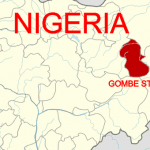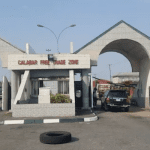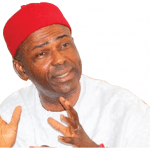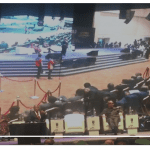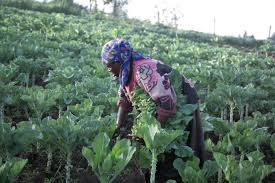 Governor of Plateau State, Simon Bako Lalong has urged farmers to key into the policy of the Federal Government to boost agricultural.production and facilitate the diversification of the economy.
Governor of Plateau State, Simon Bako Lalong has urged farmers to key into the policy of the Federal Government to boost agricultural.production and facilitate the diversification of the economy.
Lalong stated this at the Northern Agricultural Summit in Jos.
He lauded the theme of the summit which was: “Harnessing the successes of the agricultural sector in Northern Nigeria and Plateau State.”
Lalong said it will definitely contribute towards sustainable agricultural production, not just in the North but the nation at large.
Lalong said: “The theme of this year’s summit is apt and timely, especially when viewed against the backdrop of our commitment to addressing the critical issues of food security and economic diversification and the commercialisation of agriculture in Northern Nigeria and Nigeria in general.
“It is delightful to also note that this conference has in attendance the academia, including crop and livestock farmers and technocrats from the various ministries of agriculture in the north. This hopefully underscores the significance of the summit, with a very strong belief that the quality of discussions will continue to assist us in attaining our set objectives of national food production, security and poverty alleviation.
“Since we assumed office in May 2015, we have spent considerable time and energy reviewing the challenges that had in the past prevented the emergence of Nigeria as the bread basket of Africa, given our enormous resources. The immediate answer was that majority of our farmers were small holders with average holdings of one hectare or less.
“However, further probe into these revealed that our agriculture is characterised by some critical issues, such as subsistence farming methods; poorly fertile soils due to low fertilizer usage per hectare; inadequate access to the right quality farm input; low technology application; bad agronomy practices; poor road rural network and other vital infrastructure; high prevalence of crop and livestock diseases; and inadequate research and low uptake or utilisation of research results, and so on.
“This list is by no means exhaustive, but it provided us with the scenario on ground of which Plateau State is not an exception. The next challenge for us then was how far we could go in an effort to address these critical issues. With due sense of modesty, let me state that within the over three years of being in office, we have re-modeled, supported and enhanced some of our crucial agricultural projects and programmes. Currently, we are sustaining this through harnessing agro-enterprises, where we possess near absolute comparative advantage and collaboration with individuals, firms, and agencies that are professionally reputable.
“It is necessary for me to reel out some of our laudable achievements in the agricultural sector which includes the Potato Seedling Multiplication Project.
“In view of the recent increased incidence in potato blight disease, farmers have continued to record decline in yields, government sought the assistance of the federal ministry of agriculture and rural development in procuring 10 metric tons of a blight resistant variety of potato called the Mirabella from the Republic of Germany.
“The project has since been inaugurated in Kwall, Bassa Local Government Area and foundation seeds distributed to farmers by the supervising consultant. The yield from the multiplication units have been sold to farmers for planting. The government had initially targeted 2,500 farmers and all have benefited from this improved variety”.
 Governor of Plateau State, Simon Bako Lalong has urged farmers to key into the policy of the Federal Government to boost agricultural.production and facilitate the diversification of the economy.
Governor of Plateau State, Simon Bako Lalong has urged farmers to key into the policy of the Federal Government to boost agricultural.production and facilitate the diversification of the economy.
Lalong stated this at the Northern Agricultural Summit in Jos.
He lauded the theme of the summit which was: “Harnessing the successes of the agricultural sector in Northern Nigeria and Plateau State.”
Lalong said it will definitely contribute towards sustainable agricultural production, not just in the North but the nation at large.
Lalong said: “The theme of this year’s summit is apt and timely, especially when viewed against the backdrop of our commitment to addressing the critical issues of food security and economic diversification and the commercialisation of agriculture in Northern Nigeria and Nigeria in general.
“It is delightful to also note that this conference has in attendance the academia, including crop and livestock farmers and technocrats from the various ministries of agriculture in the north. This hopefully underscores the significance of the summit, with a very strong belief that the quality of discussions will continue to assist us in attaining our set objectives of national food production, security and poverty alleviation.
“Since we assumed office in May 2015, we have spent considerable time and energy reviewing the challenges that had in the past prevented the emergence of Nigeria as the bread basket of Africa, given our enormous resources. The immediate answer was that majority of our farmers were small holders with average holdings of one hectare or less.
“However, further probe into these revealed that our agriculture is characterised by some critical issues, such as subsistence farming methods; poorly fertile soils due to low fertilizer usage per hectare; inadequate access to the right quality farm input; low technology application; bad agronomy practices; poor road rural network and other vital infrastructure; high prevalence of crop and livestock diseases; and inadequate research and low uptake or utilisation of research results, and so on.
“This list is by no means exhaustive, but it provided us with the scenario on ground of which Plateau State is not an exception. The next challenge for us then was how far we could go in an effort to address these critical issues. With due sense of modesty, let me state that within the over three years of being in office, we have re-modeled, supported and enhanced some of our crucial agricultural projects and programmes. Currently, we are sustaining this through harnessing agro-enterprises, where we possess near absolute comparative advantage and collaboration with individuals, firms, and agencies that are professionally reputable.
“It is necessary for me to reel out some of our laudable achievements in the agricultural sector which includes the Potato Seedling Multiplication Project.
“In view of the recent increased incidence in potato blight disease, farmers have continued to record decline in yields, government sought the assistance of the federal ministry of agriculture and rural development in procuring 10 metric tons of a blight resistant variety of potato called the Mirabella from the Republic of Germany.
“The project has since been inaugurated in Kwall, Bassa Local Government Area and foundation seeds distributed to farmers by the supervising consultant. The yield from the multiplication units have been sold to farmers for planting. The government had initially targeted 2,500 farmers and all have benefited from this improved variety”.
 Governor of Plateau State, Simon Bako Lalong has urged farmers to key into the policy of the Federal Government to boost agricultural.production and facilitate the diversification of the economy.
Governor of Plateau State, Simon Bako Lalong has urged farmers to key into the policy of the Federal Government to boost agricultural.production and facilitate the diversification of the economy.
Lalong stated this at the Northern Agricultural Summit in Jos.
He lauded the theme of the summit which was: “Harnessing the successes of the agricultural sector in Northern Nigeria and Plateau State.”
Lalong said it will definitely contribute towards sustainable agricultural production, not just in the North but the nation at large.
Lalong said: “The theme of this year’s summit is apt and timely, especially when viewed against the backdrop of our commitment to addressing the critical issues of food security and economic diversification and the commercialisation of agriculture in Northern Nigeria and Nigeria in general.
“It is delightful to also note that this conference has in attendance the academia, including crop and livestock farmers and technocrats from the various ministries of agriculture in the north. This hopefully underscores the significance of the summit, with a very strong belief that the quality of discussions will continue to assist us in attaining our set objectives of national food production, security and poverty alleviation.
“Since we assumed office in May 2015, we have spent considerable time and energy reviewing the challenges that had in the past prevented the emergence of Nigeria as the bread basket of Africa, given our enormous resources. The immediate answer was that majority of our farmers were small holders with average holdings of one hectare or less.
“However, further probe into these revealed that our agriculture is characterised by some critical issues, such as subsistence farming methods; poorly fertile soils due to low fertilizer usage per hectare; inadequate access to the right quality farm input; low technology application; bad agronomy practices; poor road rural network and other vital infrastructure; high prevalence of crop and livestock diseases; and inadequate research and low uptake or utilisation of research results, and so on.
“This list is by no means exhaustive, but it provided us with the scenario on ground of which Plateau State is not an exception. The next challenge for us then was how far we could go in an effort to address these critical issues. With due sense of modesty, let me state that within the over three years of being in office, we have re-modeled, supported and enhanced some of our crucial agricultural projects and programmes. Currently, we are sustaining this through harnessing agro-enterprises, where we possess near absolute comparative advantage and collaboration with individuals, firms, and agencies that are professionally reputable.
“It is necessary for me to reel out some of our laudable achievements in the agricultural sector which includes the Potato Seedling Multiplication Project.
“In view of the recent increased incidence in potato blight disease, farmers have continued to record decline in yields, government sought the assistance of the federal ministry of agriculture and rural development in procuring 10 metric tons of a blight resistant variety of potato called the Mirabella from the Republic of Germany.
“The project has since been inaugurated in Kwall, Bassa Local Government Area and foundation seeds distributed to farmers by the supervising consultant. The yield from the multiplication units have been sold to farmers for planting. The government had initially targeted 2,500 farmers and all have benefited from this improved variety”.
 Governor of Plateau State, Simon Bako Lalong has urged farmers to key into the policy of the Federal Government to boost agricultural.production and facilitate the diversification of the economy.
Governor of Plateau State, Simon Bako Lalong has urged farmers to key into the policy of the Federal Government to boost agricultural.production and facilitate the diversification of the economy.
Lalong stated this at the Northern Agricultural Summit in Jos.
He lauded the theme of the summit which was: “Harnessing the successes of the agricultural sector in Northern Nigeria and Plateau State.”
Lalong said it will definitely contribute towards sustainable agricultural production, not just in the North but the nation at large.
Lalong said: “The theme of this year’s summit is apt and timely, especially when viewed against the backdrop of our commitment to addressing the critical issues of food security and economic diversification and the commercialisation of agriculture in Northern Nigeria and Nigeria in general.
“It is delightful to also note that this conference has in attendance the academia, including crop and livestock farmers and technocrats from the various ministries of agriculture in the north. This hopefully underscores the significance of the summit, with a very strong belief that the quality of discussions will continue to assist us in attaining our set objectives of national food production, security and poverty alleviation.
“Since we assumed office in May 2015, we have spent considerable time and energy reviewing the challenges that had in the past prevented the emergence of Nigeria as the bread basket of Africa, given our enormous resources. The immediate answer was that majority of our farmers were small holders with average holdings of one hectare or less.
“However, further probe into these revealed that our agriculture is characterised by some critical issues, such as subsistence farming methods; poorly fertile soils due to low fertilizer usage per hectare; inadequate access to the right quality farm input; low technology application; bad agronomy practices; poor road rural network and other vital infrastructure; high prevalence of crop and livestock diseases; and inadequate research and low uptake or utilisation of research results, and so on.
“This list is by no means exhaustive, but it provided us with the scenario on ground of which Plateau State is not an exception. The next challenge for us then was how far we could go in an effort to address these critical issues. With due sense of modesty, let me state that within the over three years of being in office, we have re-modeled, supported and enhanced some of our crucial agricultural projects and programmes. Currently, we are sustaining this through harnessing agro-enterprises, where we possess near absolute comparative advantage and collaboration with individuals, firms, and agencies that are professionally reputable.
“It is necessary for me to reel out some of our laudable achievements in the agricultural sector which includes the Potato Seedling Multiplication Project.
“In view of the recent increased incidence in potato blight disease, farmers have continued to record decline in yields, government sought the assistance of the federal ministry of agriculture and rural development in procuring 10 metric tons of a blight resistant variety of potato called the Mirabella from the Republic of Germany.
“The project has since been inaugurated in Kwall, Bassa Local Government Area and foundation seeds distributed to farmers by the supervising consultant. The yield from the multiplication units have been sold to farmers for planting. The government had initially targeted 2,500 farmers and all have benefited from this improved variety”.
 Governor of Plateau State, Simon Bako Lalong has urged farmers to key into the policy of the Federal Government to boost agricultural.production and facilitate the diversification of the economy.
Governor of Plateau State, Simon Bako Lalong has urged farmers to key into the policy of the Federal Government to boost agricultural.production and facilitate the diversification of the economy.
Lalong stated this at the Northern Agricultural Summit in Jos.
He lauded the theme of the summit which was: “Harnessing the successes of the agricultural sector in Northern Nigeria and Plateau State.”
Lalong said it will definitely contribute towards sustainable agricultural production, not just in the North but the nation at large.
Lalong said: “The theme of this year’s summit is apt and timely, especially when viewed against the backdrop of our commitment to addressing the critical issues of food security and economic diversification and the commercialisation of agriculture in Northern Nigeria and Nigeria in general.
“It is delightful to also note that this conference has in attendance the academia, including crop and livestock farmers and technocrats from the various ministries of agriculture in the north. This hopefully underscores the significance of the summit, with a very strong belief that the quality of discussions will continue to assist us in attaining our set objectives of national food production, security and poverty alleviation.
“Since we assumed office in May 2015, we have spent considerable time and energy reviewing the challenges that had in the past prevented the emergence of Nigeria as the bread basket of Africa, given our enormous resources. The immediate answer was that majority of our farmers were small holders with average holdings of one hectare or less.
“However, further probe into these revealed that our agriculture is characterised by some critical issues, such as subsistence farming methods; poorly fertile soils due to low fertilizer usage per hectare; inadequate access to the right quality farm input; low technology application; bad agronomy practices; poor road rural network and other vital infrastructure; high prevalence of crop and livestock diseases; and inadequate research and low uptake or utilisation of research results, and so on.
“This list is by no means exhaustive, but it provided us with the scenario on ground of which Plateau State is not an exception. The next challenge for us then was how far we could go in an effort to address these critical issues. With due sense of modesty, let me state that within the over three years of being in office, we have re-modeled, supported and enhanced some of our crucial agricultural projects and programmes. Currently, we are sustaining this through harnessing agro-enterprises, where we possess near absolute comparative advantage and collaboration with individuals, firms, and agencies that are professionally reputable.
“It is necessary for me to reel out some of our laudable achievements in the agricultural sector which includes the Potato Seedling Multiplication Project.
“In view of the recent increased incidence in potato blight disease, farmers have continued to record decline in yields, government sought the assistance of the federal ministry of agriculture and rural development in procuring 10 metric tons of a blight resistant variety of potato called the Mirabella from the Republic of Germany.
“The project has since been inaugurated in Kwall, Bassa Local Government Area and foundation seeds distributed to farmers by the supervising consultant. The yield from the multiplication units have been sold to farmers for planting. The government had initially targeted 2,500 farmers and all have benefited from this improved variety”.
 Governor of Plateau State, Simon Bako Lalong has urged farmers to key into the policy of the Federal Government to boost agricultural.production and facilitate the diversification of the economy.
Governor of Plateau State, Simon Bako Lalong has urged farmers to key into the policy of the Federal Government to boost agricultural.production and facilitate the diversification of the economy.
Lalong stated this at the Northern Agricultural Summit in Jos.
He lauded the theme of the summit which was: “Harnessing the successes of the agricultural sector in Northern Nigeria and Plateau State.”
Lalong said it will definitely contribute towards sustainable agricultural production, not just in the North but the nation at large.
Lalong said: “The theme of this year’s summit is apt and timely, especially when viewed against the backdrop of our commitment to addressing the critical issues of food security and economic diversification and the commercialisation of agriculture in Northern Nigeria and Nigeria in general.
“It is delightful to also note that this conference has in attendance the academia, including crop and livestock farmers and technocrats from the various ministries of agriculture in the north. This hopefully underscores the significance of the summit, with a very strong belief that the quality of discussions will continue to assist us in attaining our set objectives of national food production, security and poverty alleviation.
“Since we assumed office in May 2015, we have spent considerable time and energy reviewing the challenges that had in the past prevented the emergence of Nigeria as the bread basket of Africa, given our enormous resources. The immediate answer was that majority of our farmers were small holders with average holdings of one hectare or less.
“However, further probe into these revealed that our agriculture is characterised by some critical issues, such as subsistence farming methods; poorly fertile soils due to low fertilizer usage per hectare; inadequate access to the right quality farm input; low technology application; bad agronomy practices; poor road rural network and other vital infrastructure; high prevalence of crop and livestock diseases; and inadequate research and low uptake or utilisation of research results, and so on.
“This list is by no means exhaustive, but it provided us with the scenario on ground of which Plateau State is not an exception. The next challenge for us then was how far we could go in an effort to address these critical issues. With due sense of modesty, let me state that within the over three years of being in office, we have re-modeled, supported and enhanced some of our crucial agricultural projects and programmes. Currently, we are sustaining this through harnessing agro-enterprises, where we possess near absolute comparative advantage and collaboration with individuals, firms, and agencies that are professionally reputable.
“It is necessary for me to reel out some of our laudable achievements in the agricultural sector which includes the Potato Seedling Multiplication Project.
“In view of the recent increased incidence in potato blight disease, farmers have continued to record decline in yields, government sought the assistance of the federal ministry of agriculture and rural development in procuring 10 metric tons of a blight resistant variety of potato called the Mirabella from the Republic of Germany.
“The project has since been inaugurated in Kwall, Bassa Local Government Area and foundation seeds distributed to farmers by the supervising consultant. The yield from the multiplication units have been sold to farmers for planting. The government had initially targeted 2,500 farmers and all have benefited from this improved variety”.
 Governor of Plateau State, Simon Bako Lalong has urged farmers to key into the policy of the Federal Government to boost agricultural.production and facilitate the diversification of the economy.
Governor of Plateau State, Simon Bako Lalong has urged farmers to key into the policy of the Federal Government to boost agricultural.production and facilitate the diversification of the economy.
Lalong stated this at the Northern Agricultural Summit in Jos.
He lauded the theme of the summit which was: “Harnessing the successes of the agricultural sector in Northern Nigeria and Plateau State.”
Lalong said it will definitely contribute towards sustainable agricultural production, not just in the North but the nation at large.
Lalong said: “The theme of this year’s summit is apt and timely, especially when viewed against the backdrop of our commitment to addressing the critical issues of food security and economic diversification and the commercialisation of agriculture in Northern Nigeria and Nigeria in general.
“It is delightful to also note that this conference has in attendance the academia, including crop and livestock farmers and technocrats from the various ministries of agriculture in the north. This hopefully underscores the significance of the summit, with a very strong belief that the quality of discussions will continue to assist us in attaining our set objectives of national food production, security and poverty alleviation.
“Since we assumed office in May 2015, we have spent considerable time and energy reviewing the challenges that had in the past prevented the emergence of Nigeria as the bread basket of Africa, given our enormous resources. The immediate answer was that majority of our farmers were small holders with average holdings of one hectare or less.
“However, further probe into these revealed that our agriculture is characterised by some critical issues, such as subsistence farming methods; poorly fertile soils due to low fertilizer usage per hectare; inadequate access to the right quality farm input; low technology application; bad agronomy practices; poor road rural network and other vital infrastructure; high prevalence of crop and livestock diseases; and inadequate research and low uptake or utilisation of research results, and so on.
“This list is by no means exhaustive, but it provided us with the scenario on ground of which Plateau State is not an exception. The next challenge for us then was how far we could go in an effort to address these critical issues. With due sense of modesty, let me state that within the over three years of being in office, we have re-modeled, supported and enhanced some of our crucial agricultural projects and programmes. Currently, we are sustaining this through harnessing agro-enterprises, where we possess near absolute comparative advantage and collaboration with individuals, firms, and agencies that are professionally reputable.
“It is necessary for me to reel out some of our laudable achievements in the agricultural sector which includes the Potato Seedling Multiplication Project.
“In view of the recent increased incidence in potato blight disease, farmers have continued to record decline in yields, government sought the assistance of the federal ministry of agriculture and rural development in procuring 10 metric tons of a blight resistant variety of potato called the Mirabella from the Republic of Germany.
“The project has since been inaugurated in Kwall, Bassa Local Government Area and foundation seeds distributed to farmers by the supervising consultant. The yield from the multiplication units have been sold to farmers for planting. The government had initially targeted 2,500 farmers and all have benefited from this improved variety”.
 Governor of Plateau State, Simon Bako Lalong has urged farmers to key into the policy of the Federal Government to boost agricultural.production and facilitate the diversification of the economy.
Governor of Plateau State, Simon Bako Lalong has urged farmers to key into the policy of the Federal Government to boost agricultural.production and facilitate the diversification of the economy.
Lalong stated this at the Northern Agricultural Summit in Jos.
He lauded the theme of the summit which was: “Harnessing the successes of the agricultural sector in Northern Nigeria and Plateau State.”
Lalong said it will definitely contribute towards sustainable agricultural production, not just in the North but the nation at large.
Lalong said: “The theme of this year’s summit is apt and timely, especially when viewed against the backdrop of our commitment to addressing the critical issues of food security and economic diversification and the commercialisation of agriculture in Northern Nigeria and Nigeria in general.
“It is delightful to also note that this conference has in attendance the academia, including crop and livestock farmers and technocrats from the various ministries of agriculture in the north. This hopefully underscores the significance of the summit, with a very strong belief that the quality of discussions will continue to assist us in attaining our set objectives of national food production, security and poverty alleviation.
“Since we assumed office in May 2015, we have spent considerable time and energy reviewing the challenges that had in the past prevented the emergence of Nigeria as the bread basket of Africa, given our enormous resources. The immediate answer was that majority of our farmers were small holders with average holdings of one hectare or less.
“However, further probe into these revealed that our agriculture is characterised by some critical issues, such as subsistence farming methods; poorly fertile soils due to low fertilizer usage per hectare; inadequate access to the right quality farm input; low technology application; bad agronomy practices; poor road rural network and other vital infrastructure; high prevalence of crop and livestock diseases; and inadequate research and low uptake or utilisation of research results, and so on.
“This list is by no means exhaustive, but it provided us with the scenario on ground of which Plateau State is not an exception. The next challenge for us then was how far we could go in an effort to address these critical issues. With due sense of modesty, let me state that within the over three years of being in office, we have re-modeled, supported and enhanced some of our crucial agricultural projects and programmes. Currently, we are sustaining this through harnessing agro-enterprises, where we possess near absolute comparative advantage and collaboration with individuals, firms, and agencies that are professionally reputable.
“It is necessary for me to reel out some of our laudable achievements in the agricultural sector which includes the Potato Seedling Multiplication Project.
“In view of the recent increased incidence in potato blight disease, farmers have continued to record decline in yields, government sought the assistance of the federal ministry of agriculture and rural development in procuring 10 metric tons of a blight resistant variety of potato called the Mirabella from the Republic of Germany.
“The project has since been inaugurated in Kwall, Bassa Local Government Area and foundation seeds distributed to farmers by the supervising consultant. The yield from the multiplication units have been sold to farmers for planting. The government had initially targeted 2,500 farmers and all have benefited from this improved variety”.




